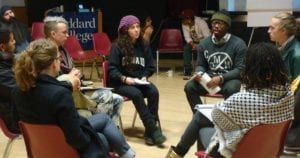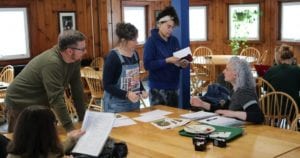Translation is impossible, poet and translator Alastair Reid told us in a small poetry workshop at Antioch College in 1970. He said you needed to know this, and then do it anyway. He describes the risk of failure in his poem, Speaking a Foreign Language: “Easy to understand,/through the tangle of language, the heart behind/groping towards us, to make the translation of/ syntax into love.” When I had the luck of meeting Alastair, he was translating the Chilean poet, Pablo Neruda. Reid was the first to translate Neruda and Borges into English having met both in 1964, and he became a steadfast advocate for Latin American literature and translator for these groundbreaking figures.
Alastair told us that when he met Neruda, they walked on the beach, and Neruda asked if he could talk with him about translating Shakespeare. Stop for a moment on that beach of stones with me, and imagine Neruda and Reid, the Scot, discussing Macbeth. I think Alastair said Neruda wanted to discuss character. Could their conversation and its twisting intensities make a play? What preoccupied Neruda about Macbeth and what drew Alastair on to learn the intricacies of Spanish which he later described as “starting a new life?”
How are we pulled into the necessities of new speech and understanding? It’s not always a choice, but sometimes, it is a gift.
Now that you’ve summoned yourself to southern Chile and imagined Shakespeare, Neruda and Reid in conversation, you have entered one world of translation and its impossibilities. The conversation on the beach would be before the election of Salvador Allende, before Neruda’s role as Chile’s Minister of Culture and before his dear friend Allende would be assassinated in a US-backed coup on September 11, 1973. To speak across this time, the origin of the politics and American involvement demands reading Neruda’s poems.
Back at Antioch in the Yellow Springs classroom, Alastair shared his Neruda translations and the process of getting as close as possible to the heart of the poems. When he read to us in Spanish, then English, we heard differently, whether we knew both languages or not. The rhythm of the line would feel certain in the native language, and we could tell that translating the feel in English might not hold the same sense rhythmically. What to do? We began to understand what it was to embody a poem and all its tonalities, never mind sly humor or irony, in translation. Alastair read us approaches he was trying out and explained the kind of problems he faced within the sound and flowing lines.
After meeting, in Alastair’s poetry workshop for awhile, we knew each other’s poems, and how Alastair felt about poetry. He welcomed surprise and treasured it; he hoped we would learn to recognize music, originality and inspiration, but he was not there to pressure us. He was there to share something else. We had gotten over some of our self-consciousness, fear and simultaneous desire for exposure. I remember an assignment to use metaphor to write about real objects, such as the corn and pigs growing in the fields around us, infamous, fresh-at-2am chocolate cake doughnuts, or the long, low concrete steps of the cafeteria where all life and organizing politics passed. Perhaps a bow to Neruda’s odes, Alastair had made sure we were curious and receptive; therefore, we were ready to write poems.
Alastair brought in the unexpected as the usual, and we never knew what he’d have up his sleeve… In one class, we memorized Gerard Manley Hopkins’ “Spring and Fall” together after he had taken apart the stresses and all the kinds of rhyme inside the poem, word by word, beginning with the amazing, dense and turbulent lines, “Márgarét, áre you grieving/ Over Goldengrove unleaving?” Learning poems by heart and reciting the song that is Hopkins was new for most of us. He helped us untangle and come to an ease, lost since childhood. Alastair was training our ears, or making us realize that we had ears to train to hear the impact of language. We became more careful and appreciative readers. Alastair gave us a welcoming hand into a world of impossibility and satisfaction. The fact that we could enter another world at all was a gift, and an ongoing source of mystery. You had to be there. My early teacher, Alastair Reid, a poet, prose writer, translator, and traveller, who Neruda called “Mr. Barefoot,” died in the fall of 2014 in New York City.
Alastair Reid’s books include Inside Out: Selected Poetry and Translations and Outside In: Selected Prose and; Oases: poems and prose; and the translations of Pablo Neruda, Fully Empowered and Extravagaria; Borges’s Selected Poems as well as translations of the Mexican poet Jose Emilio Pacheco and Cuban poet Heberto Padilla. A Tribute to Alastair Reid was held at the Americas Society in NYC in the fall of 2015.








